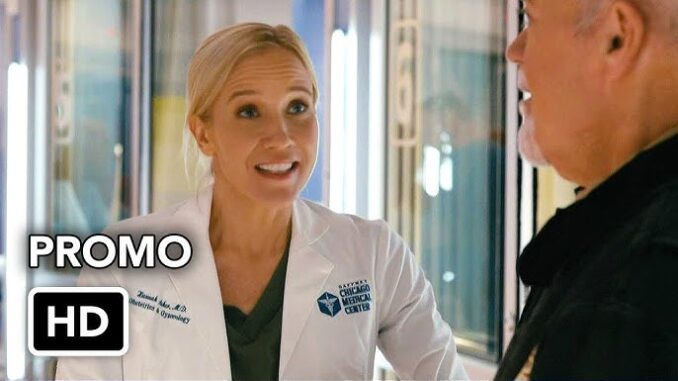
The piercing shriek of a trauma alert klaxon is the native tongue of the Gaffney Chicago Medical Center’s Emergency Department. But on the premiere night of Chicago Med‘s new season, that familiar cacophony mutated into something far more sinister, an incessant, primal scream that heralded not just another busy night, but the most profoundly stressful case yet to grip the beloved fictional hospital.
From the opening shot, the atmosphere was a character unto itself – a viscous, suffocating blanket of dread. The camera didn’t waste time with pleasantries or character updates; it plunged directly into the eye of a hurricane that had just made landfall. A multi-car pile-up on the Eisenhower Expressway, complicated by a hazmat spill, had unleashed an immediate, overwhelming deluge of patients. The usual controlled chaos of the ED transformed into an actual war zone, every surface slick with frantic energy and the grim promise of tragedy.
The defining characteristic of this episode’s stress wasn’t just the sheer volume of injured bodies, but the insidious nature of the case that emerged from the wreckage: a young family, pinned in their car beneath an overturned chemical tanker. The mother, critically injured and rapidly fading, was pregnant, her unborn child in severe distress. Her husband, barely conscious, was suffering from acute chemical burns and internal bleeding, while their five-year-old daughter, miraculously mostly unharmed physically, was in a catatonic state of shock, her small hand still clutching her mother’s, refusing to let go.
This wasn’t just a medical emergency; it was a moral gauntlet. Dr. Halstead, usually the quick-witted cynic, moved with a grim, almost desperate focus, his eyes scanning monitors, calculating risks, his voice a low, urgent murmur of medical jargon. Dr. Manning, her protective instincts blazing, felt the visceral punch of the child’s silent trauma, simultaneously battling to save the mother and the unborn baby, knowing that every choice she made would ripple through the lives of all three. Dr. Choi, ever the stoic pragmatist, was forced into impossible triage decisions, weighing the life of the chemically burned father against the dozens of others clamoring for attention, the acrid smell of burning flesh clinging to his scrubs.
The ORs became battlegrounds, the procedural rooms filled with the hushed, tense concentration of surgeons and nurses performing medical miracles under an unforgiving glare. The drama was not merely in the intricate surgical maneuvers, but in the micro-expressions of the doctors: the furrow of Dr. Goodwin’s brow as she authorized a risky procedure, Maggie Lockwood’s steel spine as she orchestrated the relentless flow of patients, the slight tremor in a surgeon’s hand after hours of working on the edge of human capability. The stress was palpable, a live wire running through every frame, threatening to snap.
What made this case the “most stressful yet” wasn’t simply the grim prognosis for the family, but the ethical quagmire it presented. Limited resources meant agonizing choices. Could they save the mother and the baby? If not, which life took precedence? The father, also fighting for his life, required a specialist tied up with another critical patient. The clock wasn’t just ticking; it was screaming. Every decision was a tightrope walk over an abyss of potential regret, forcing the characters to confront the very limits of their compassion, their skill, and their humanity.
By the episode’s harrowing conclusion, the air in the ED felt thinner, heavier, tinged with a collective exhaustion that went beyond physical fatigue. Some battles were won, others agonizingly lost. The little girl, Maya, eventually stirred, her tear-filled eyes a poignant reminder of the lives forever altered. The case wasn’t neatly wrapped up; instead, it left an open wound, a visceral testament to the fact that even in a world of medical marvels, sometimes the most profound stress comes from staring into the face of raw, unvarnished human suffering and realizing that even the most dedicated doctors are ultimately, heartbreakingly, human themselves. This premiere was not just a medical drama; it was a masterclass in tension, a visceral punch that left viewers breathless, reminding them why the pulsating heart of Chicago Med beats so powerfully.
